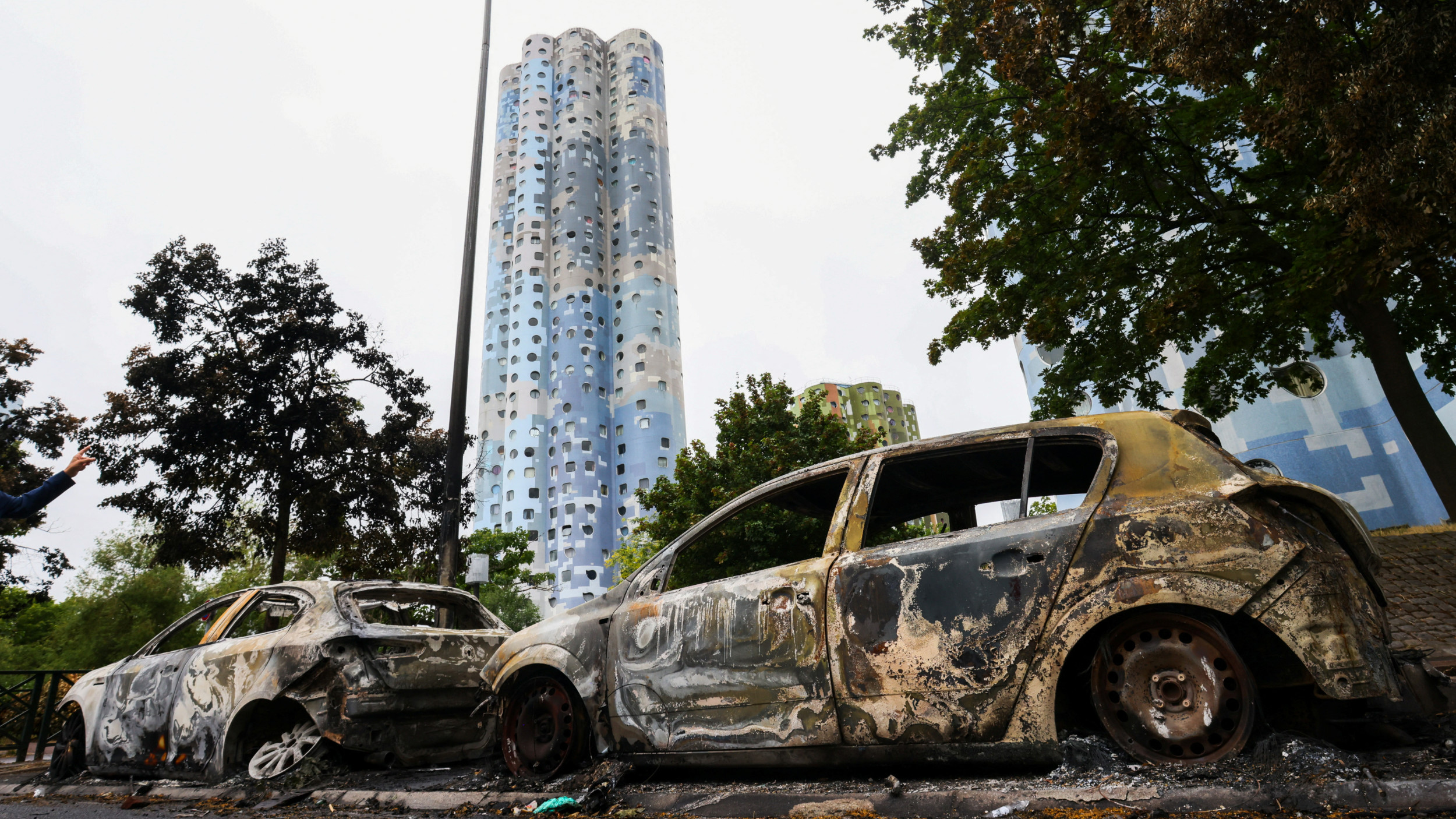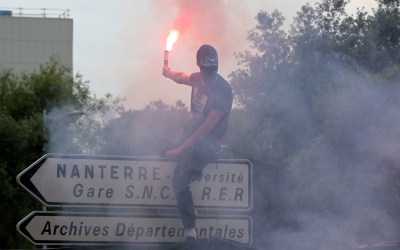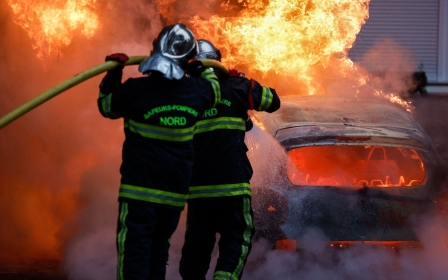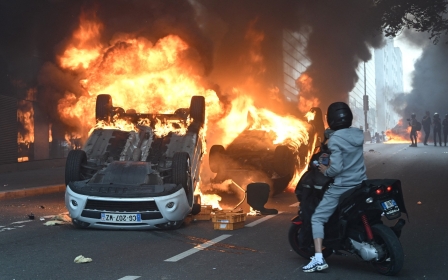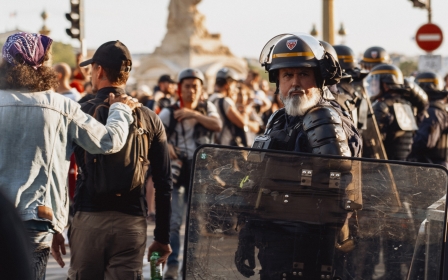France: Detained protesters challenge police accounts at quick court hearings
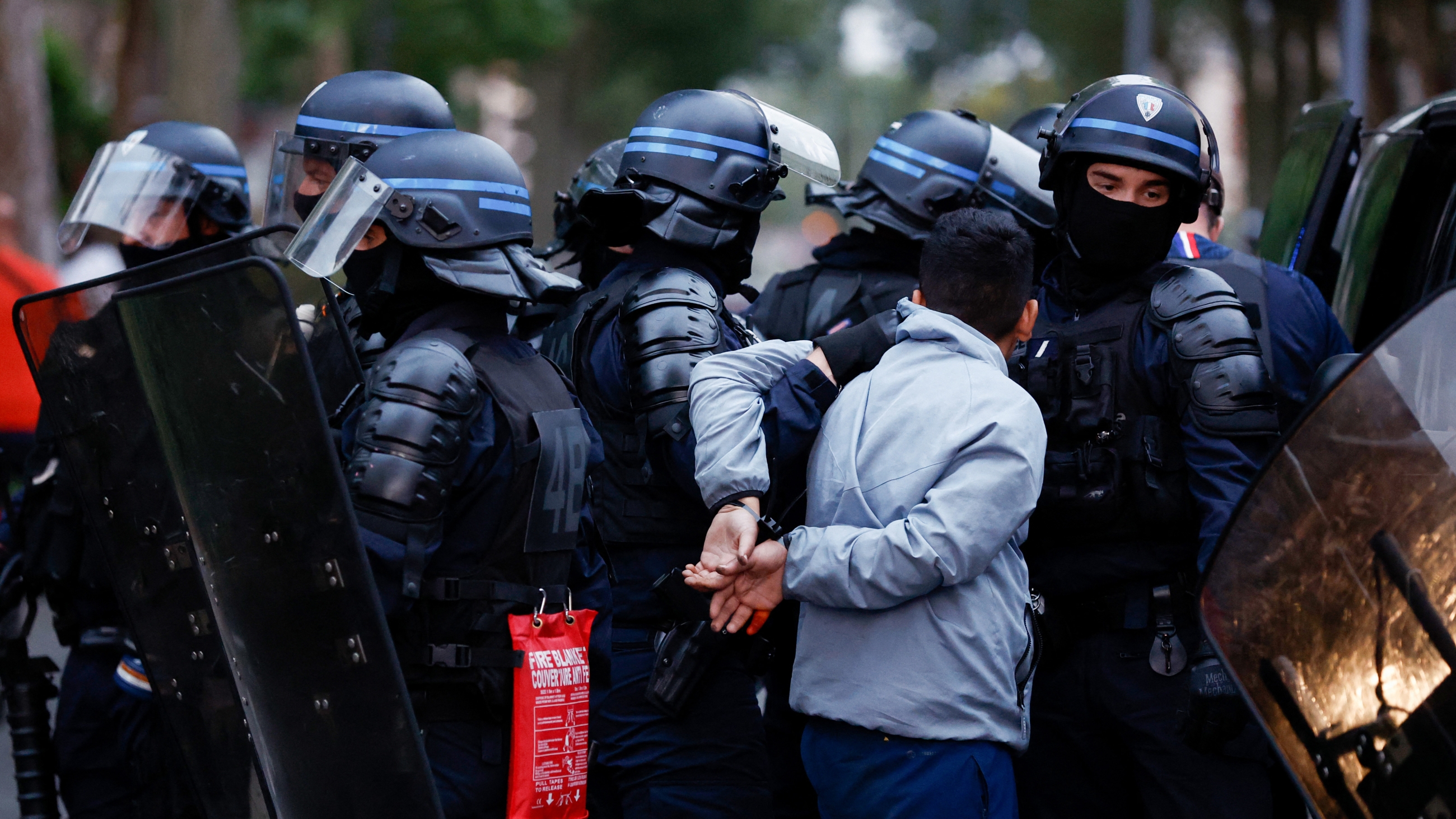
It was around 11pm when a frail young woman was led into one of the docks at the Nanterre criminal court in the French capital Paris.
With her hands cuffed behind her back, Ines* desperately looked for relatives in the courtroom after spending two days in police custody. She nervously twisted and untwisted a bun of light-coloured hair, banned from wearing her hijab in court.
"She's very afraid of going to prison," her lawyer, Maitre Benhamou, told Middle East Eye.
The 21-year-old was arrested in the Paris suburb of Nanterre on Thursday after a march commemorating Nahel M, a French teen of Algerian and Moroccan descent, who was shot dead point-blank by a policeman earlier in the week during a traffic stop.
The police arrested her that evening after she threw a soda can at an officer and missed.
Despite footage showing clearly that no officers were harmed, a policeman standing metres away quickly runs to her. He violently kicks her, removes her headscarf and tries to tackle her to the ground, before protesters at the scene manage to get her away from him, the video seen by MEE shows.
An hour later, police identified her in an adjacent street through her white hijab and arrested her.
At the court, police recounted a sequence of events that contradicted the footage of the incident.
'The police tore off her headscarf during the arrest, forbade her to put it back on at the police station and then here in the dock'
- Maitre Benhamou, lawyer
They claimed the soda can struck an officer and that Ines then tried to hit them by holding on to them.
"All this is false," said Benhamou.
"We're not dealing with a major delinquent. Ines knew Nahel; she was angry, it's true, but above all she was sad. What citizens expect today is objective justice."
The young woman's lawyer then showed the video to Benjamin Deparis, the president of the Nanterre court, who, exceptionally, had been called in to help with the heavy caseload.
The magistrate said nothing. To his right, the public prosecutor did not comment either.
"Police officers are not there to be targeted by citizens. I hope you'll remember that," the prosecutor told Ines moments later
In the box, the young defendant cried as she was sentenced to 105 hours of community service.
"Without the video to contradict the police version, the sentence would have been much heavier," Benhamou said after the hearing.
"My client spent 48 hours in police custody. This will leave its mark. The police tore off her headscarf during the arrest, forbade her to put it back on at the police station and then here in the dock."
Mass arrests
Ines was one of the hundreds of young people, mostly teenagers, who have been rounded up by French police since Thursday.
The killing of Nahel, 17, has sparked widespread anger and protests for five nights against what demonstrators say is institutionalised police racism and brutality.
The unrest has been marked by violent confrontations between young people and heavily-armed police.
Government figures released early on Saturday said 1,350 vehicles and 234 buildings had been torched overnight. There had been 2,560 incidents of fire set in public spaces, while 79 members of the security services had been wounded.
Police said they were deploying 7,000 extra officers in Paris and its inner suburbs on Sunday night, days after deploying 45,000 officers, backed by light armoured vehicles and elite police units, across the country.
By Sunday morning, police had arrested well over 3,000 people.
Many of them are appearing in court quickly, with the magistrates relying on ultra-rapid investigations carried out by police for the hearings.
Quick hearings
In court, defendants are tried in a line, often two at a time, with a maximum of one hour given to each hearing.
Belkacem*, 29, was asked at the start of his hearing if he accepted the principle of immediate appearance.
"Judge me now," he responded quickly, having spent 48 hours in custody.
Next to him is Adam*, 23, who also spent two nights at the police station.
"There's a police version that says you had firework mortars in your hand but also that you were wearing a balaclava to hide your face," the president of the Nanterre court told Adam.
The young man, being watched closely by his fiancee and mother of his son, responded by saying he was going to get some milk and sweets.
"I had a cloth over my face to protect me from the tear gas," he said.
The public prosecutor interrupted.
"So you went to get sweets and milk at 11pm in the middle of riots? Are you sure it was to get groceries?" he asked the defendant.
"Sir, your version is highly fanciful, to say the least," he said.
Adam stuttered but calmly responded.
"They wanted to catch as many people as possible that evening,” he said.
“In the car on the way to the police station, I remember them saying to me 'You're putting us all in the same bag, so we're doing the same thing.'"
Violent arrests
Adam, who was being prosecuted for misdemeanour participation in an assembly and rebellion, denied the charges against him.
With a bandage on his forehead from injuries he suffered during the arrest, he rejected the police claims.
"When they grabbed me from behind, I tried to turn around and I took a blow to the head. I bled a lot and fell to the ground. How do you expect me to rebel?" he said.
'When they grabbed me from behind, I tried to turn around and I took a blow to the head. I bled a lot and fell to the ground'
- Protester
Like Adam, Belkacem was injured during his arrest and was taken to hospital for head trauma.
The Nanterre public prosecutor said the police "acknowledge that they used truncheons to subdue these two men", but added that it was a "legitimate use of force".
He asked for seven months' imprisonment with a committal order for the pair.
The judge sentenced them to seven months' suspended imprisonment. They were released but under strict judicial supervision.
*Names have been changed to protect the identity of the defendants
This article is available in French on Middle East Eye French edition.
Middle East Eye propose une couverture et une analyse indépendantes et incomparables du Moyen-Orient, de l’Afrique du Nord et d’autres régions du monde. Pour en savoir plus sur la reprise de ce contenu et les frais qui s’appliquent, veuillez remplir ce formulaire [en anglais]. Pour en savoir plus sur MEE, cliquez ici [en anglais].


